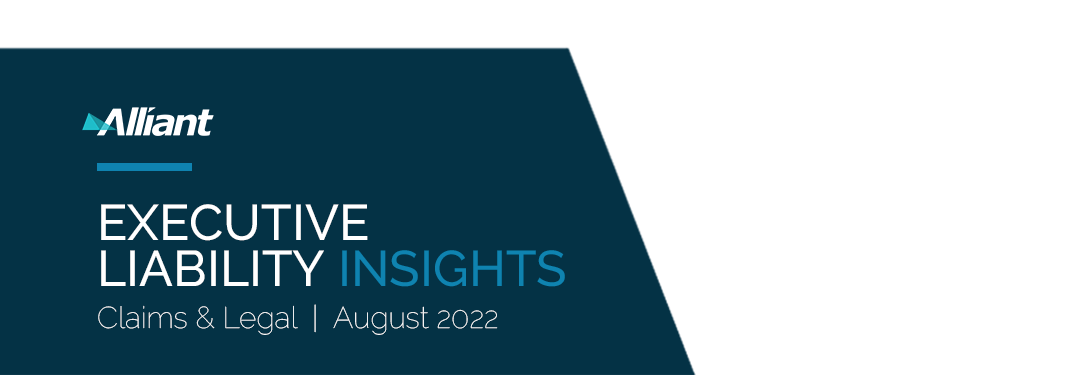
Navigating today’s complex risk environment can be a monumental task. Steve Shappell, Alliant Claims & Legal, spearheads Executive Liability Insights, a monthly review of news, legal developments and information on executive liability, cyber risk, employment practices liability, class action trends and more.

FEATURED ARTICLE
INSURER SEEKS TO RESCIND CYBER POLICY DUE TO MISREPRESENTATIONS IN APPLICATION
Travelers Prop. Cas. Co. of Am. v. International Control Servs., Inc., No. 2:22-cv-02145-CSB-EIL (D. Ill. Jul. 6, 2022)
An electronic manufacturing services company purchased a cyber liability insurance policy, and in doing so, completed an application that contained a question regarding the company’s use of multi-factor authentication (“MFA”). MFA is the use of two of more means of identification and access control to verify a user’s identity to gain privileged access to a company’s systems.
In This Issue:
INSURER SEEKS TO RESCIND CYBER POLICY DUE TO MISREPRESENTATIONS IN APPLICATIONS
Travelers Prop. Cas. Co. of Am. v. International Control Servs., Inc., No. 2:22-cv-02145-CSB-EIL (D. Ill. Jul. 6, 2022)
An electronic manufacturing services company purchased a cyber liability insurance policy, and in doing so, completed an application that contained a question regarding the company’s use of multi-factor authentication (“MFA”). MFA is the use of two of more means of identification and access control to verify a user’s identity to gain privileged access to a company’s systems. The company responded in the affirmative to the MFA question, as well as to a similar attestation regarding the use of MFA.
Read More >>
DELAWARE CHANCERY COURT RELIES ON ZUCKERBERG THREE PRONG TEST
In Re Carvana Co. Stockholders Litig., No. 2020-0415-KJSM (Del. Ch. Jun. 30, 2022)
Shareholders of an e-commerce automotive retailer filed a derivative action against the company’s board of directors, alleging they breached their fiduciary duties in connection with a limited participation direct offering of common stock.
Read More >>
SPAC REVENUE PROJECTIONS NOT TANTAMOUNT TO FRAUD
Jedrzejcyk, et al., v. Skillz Inc., et al. No. 21-cv-03450-RS (N.D. Cal. Jul. 5, 2022)
Shortly after a corporate merger, a special purpose acquisition company (“SPAC”), which was involved in online gaming technology, became the target of research reports regarding the overstatement of its revenue projections. Specifically, the reports questioned the SPAC’s practice of recognizing non-cash amounts as revenues and suggested the SPAC was recycling its incentive bonuses back to the SPAC in user fees.
Read More >>
UNREGISTERED SECURITIES EXCLUSION IN PROFESSIONAL LIABILITY POLICY RELIEVES INSURER OF DEFENSE OBLIGATION
Saoud v. Everest Indem. Ins. Co., No. 21-1621 (6th Cir. Jul. 14, 2022)
The Sixth Circuit Court of Appeals recently confirmed that a professional liability insurer was not required to cover costs sustained by a financial adviser accused of selling unregistered securities. The coverage dispute arose after several of the adviser’s clients brought suit, claiming the adviser misrepresented the nature of the products and violated securities laws by selling unregistered securities.
Read More >>
BREACH OF CONTRACT EXCLUSION IN PRIVATE EQUITY LIABILITY POLICY PRECLUDES DEFENSE OBLIGATION IN DRUG CARTEL FRAUD CASE
AKN Holdings, LLC v. Great Am. E&S Ins. Co., No. 21-55590 (9th Cir. Jul. 8, 2022)
As covered in the June 2021 Executive Liability Insights, a private equity firm purchased a manufacturing facility from a supplier of laboratory equipment, only to discover that the facility was overrun by a drug cartel. Despite learning of this situation, the firm then sold the facility to a real estate developer.
Read More >>
ERISA CASE INVOLVING MUTUAL FUND CLASS SELECTION MOVES FORWARD
Forman, et al. v. TriHealth, Inc., et al., No. 21-3977 (6th Cir. Jul. 13, 2022)
Employees of a management services company filed suit against their employer under the Employee Retirement Income Security Act (“ERISA”). The putative class action, which was brought on behalf of participants in the company’s 401(k) plan, alleged the company breached its duty of prudence and acted disloyally by failing to monitor the plan’s investments. The employees claimed the company offered more expensive mutual fund shares, while shares with the same investment strategy, management team, and investments were available at lower costs.
Read More >>
CYBER CORNER
Click to read the following cases:
- BREACH EXCLUSION IN E&O POLICY PRECLUDES COVERAGE FOR SOCIAL ENGINEERING CLAIM
- COURT DISMISSES RETAILER’S CLAIM OF ECONOMIC LOSS FOLLOWING PIPELINE CYBERATTACK
- COURT DENIES INSURER’S MOTION TO DISMISS IN TRADEMARK INFRINGEMENT CLAIM
- CALIFORNIA DATA BREACH HIGHLIGHTS THE IMPORTANCE OF CYBERSECURITY FOR PUBLIC ENTITIES
Read More >>
EPL CORNER
Click to read the following cases:
- LATE NOTICE PRECLUDES COVERAGE FOR SEXUAL HARASSMENT CLAIM UNDER EPL POLICY
- PRIOR ACTS EXCLUSION PRECLUDES COVERAGE FOR JUDGMENT IN PAY DISCRIMINATION SUIT
- U.S. ANTI-RETALIATION LAWS AFFORD NO PROTECTION FOR FOREIGN JURISDICTIONS
Read More >>
SEC CORNER
Click to view the following cases:
- JULY 2022 NOTEWORTHY ENFORCEMENT ACTIONS FILED
- JULY 2022 NOTEWORTHY SETTLEMENTS AND JUDGMENTS
Read More >>
SHAREHOLDER CORNER
Click to view:
JULY 2022 SECURITIES CLASS ACTION FILINGS
Read More >>
INSURER SEEKS TO RESCIND CYBER POLICY DUE TO MISREPRESENTATIONS IN APPLICATION
Travelers Prop. Cas. Co. of Am. v. International Control Servs., Inc., No. 2:22-cv-02145-CSB-EIL (D. Ill. Jul. 6, 2022)
An electronic manufacturing services company purchased a cyber liability insurance policy, and in doing so, completed an application that contained a question regarding the company’s use of multi-factor authentication (“MFA”).

MFA is the use of two of more means of identification and access control to verify a user’s identity to gain privileged access to a company’s systems. The company responded in the affirmative to the MFA question, as well as to a similar attestation regarding the use of MFA. The application was signed by the company’s CEO and submitted to the cyber insurer.
Several months after the policy was bound, the company was the victim of a ransomware attack, whereby intruders gained access to its server and infected it with a virus. The company notified its cyber insurer of the ransomware attack and sought coverage under its policy. During the course of the insurer’s investigation, it was revealed that MFA was only being used to protect the company’s firewall, and not to protect the server. As a result, the insurer filed suit against the company, alleging that the statements made in the application constituted misrepresentations that materially affected the insurer’s acceptance of the risk. Accordingly, the insurer sought to rescind the policy, which if granted, would enable it to treat the policy as if it never existed, leaving the company with no coverage for any losses, costs, or claims.
The Takeaway
Considering the state of the cyber liability marketplace, underwriters have become more discerning regarding the risks they are willing to undertake and the type of underwriting information required to evaluate those risks. Policy applications, like the one at issue here, are seeking more granular details regarding insureds’ security controls and procedures. It is important to consult closely with your broker when completing applications so as to confirm that the questions being asked are clear and unambiguous and ensure all responses are as accurate as possible.
DELAWARE CHANCERY COURT RELIES ON ZUCKERBERG THREE PRONG TEST
In Re Carvana Co. Stockholders Litig., No. 2020-0415-KJSM (Del. Ch. Jun. 30, 2022)
Shareholders of an e-commerce automotive retailer filed a derivative action against the company’s board of directors, alleging they breached their fiduciary duties in connection with a limited participation direct offering of common stock. The shareholders alleged they were unfairly excluded from the offering and that the handpicked insiders who were permitted to purchase the subject shares did so at a below-market discounted price.

In a derivative suit, shareholders may make a litigation demand to the board before initiating proceedings but are not required to do so. If the shareholders fail to make a litigation demand, they must demonstrate why such a demand would be futile. In the instant case, the board sought to dismiss the lawsuit, alleging the shareholders failed to plead demand futility. In response, the shareholders argued that pursuant to the recent three-prong test set forth in UFCW v. Zuckerberg, demand was excused because at least half of the directors either received a material personal benefit, faced a substantial likelihood of liability, or lacked independence from someone who received a material personal benefit.
The court evaluated demand futility on a director-by-director basis and held that half of the directors met at least one of the prongs set forth in Zuckerberg. Therefore, the court found demand on the board had been excused.
The Takeaway
As discussed in the October 2021 and January 2022 editions of Executive Liability Insights, several recent Delaware cases adjudicated since Zuckerberg resulted in favorable dismissals of derivative litigation commenced without the requisite pre-litigation board demand. Not only did the case at hand have a different outcome, but it appears the boards will not be able to rely on the business judgment rule and will instead need to demonstrate that a transaction was “entirely fair” to prevail on the merits. It remains to be seen whether the above decision will result in increased litigation costs in derivative matters.
SPAC REVENUE PROJECTIONS NOT TANTAMOUNT TO FRAUD
Jedrzejcyk, et al., v. Skillz Inc., et al. No. 21-cv-03450-RS (N.D. Cal. Jul. 5, 2022)

Shortly after a corporate merger, a special purpose acquisition company (“SPAC”), which was involved in online gaming technology, became the target of research reports regarding the overstatement of its revenue projections. Specifically, the reports questioned the SPAC’s practice of recognizing non-cash amounts as revenues and suggested the SPAC was recycling its incentive bonuses back to the SPAC in user fees. Thereafter, the SPAC’s share price significantly declined and shareholders brought a securities class action case against the SPAC due to the overvaluation of its revenue. The shareholders alleged the SPAC disseminated false and misleading statements and metrics regarding technical ability and growth, and misrepresented its financial status.
The court found the statements made by the SPAC as to its revenue did not amount to fraud or an intent to defraud. Moreover, the statements regarding growth were mere corporate puffery, and as such, were non-actionable forward-looking statements, according to the court. Furthermore, the court found the SPAC was not required to disclose all possible metrics, just known trends and uncertainties.
The Takeaway
It remains to be seen in these early days of SPAC litigation whether this decision will set precedent for future cases. Of note is the shareholders’ reliance on short seller reports as the basis for their allegations, which appears to be a trend in SPAC-related litigation.
UNREGISTERED SECURITIES EXCLUSION IN PROFESSIONAL LIABILITY POLICY RELIEVES INSURER OF DEFENSE OBLIGATION
Saoud v. Everest Indem. Ins. Co., No. 21-1621 (6th Cir. Jul. 14, 2022)
The Sixth Circuit Court of Appeals recently confirmed that a professional liability insurer was not required to cover costs sustained by a financial adviser accused of selling unregistered securities. The coverage dispute arose after several of the adviser’s clients brought suit, claiming the adviser misrepresented the nature of the products and violated securities laws by selling unregistered securities. With multiple suits pending, the adviser tendered the actions under its professional liability policy, seeking defense and indemnification.

The policy contained an unregistered securities exclusion, which precluded coverage for “Loss resulting from any Claim against an Insured ... [b]ased upon, attributable to, or arising out of the use of or investment in any security that is not registered with the Securities and Exchange Commission.” The adviser contended that the unmatured notes at issue were not securities, unregistered or otherwise. The trial court, however, disagreed, finding that “certain investment products from a now bankrupt entity that the asset manager advised clients to buy,” met the U.S. Securities and Exchange Commission’s definition of “securities.” As such, the unregistered securities exclusion barred coverage, the court found.
The adviser also argued it was entitled to a defense and indemnification because the insurer did not formally deny coverage based on the unregistered securities exclusion until after the commencement of the coverage litigation. Here too, the court disagreed, stating that “even where insurers deny coverage later than they otherwise could have, Michigan law generally doesn't allow a policyholder to circumvent a policy's clearly applicable exclusion. The only way around that doctrine is when an insurer's actions cause substantial inequity to an insured.”
The Takeaway
The court in the case at hand allowed the application of an exclusion, even where the insurer’s denial was untimely. This elucidates why policy exclusions should be closely scrutinized; an insurer will not be required to defend claims for damages that are expressly excluded by the policy wording.
BREACH OF CONTRACT EXCLUSION IN PRIVATE EQUITY LIABILITY POLICY PRECLUDES DEFENSE OBLIGATION IN DRUG CARTEL FRAUD CASE
AKN Holdings, LLC v. Great Am. E&S Ins. Co., No. 21-55590 (9th Cir. Jul. 8, 2022)
As covered in the June 2021 Executive Liability Insights, a private equity firm purchased a manufacturing facility from a supplier of laboratory equipment, only to discover that the facility was overrun by a drug cartel. Despite learning of this situation, the firm then sold the facility to a real estate developer. The firm, however, failed to reveal the presence of the cartel to the developer, and the developer subsequently sued the firm for breach of contract and fraud.

The firm tendered the suit under its private equity liability insurance policy, but the insurer refused to defend the action, citing the policy’s breach of contract exclusion. The exclusion provided there was no coverage for any claim “based upon, arising from, or in any way related to any actual or alleged breach of contract,” unless liability “would have attached even in the absence of such contract or agreement.” While the parties acknowledged that the complaint alleged “wrongful acts” as defined in the policy, coverage litigation ensued.
The Ninth Circuit Court of Appeals noted that California courts have interpreted the terms “arising out of” or “arising from” broadly, and that this wording merely connotes the necessity of a minimal causal connection or incidental relationship. Furthermore, the court noted that, because the alleged fraud in the underlying action could not have been completed absent a final purchase agreement, the fraud claims could likewise have not existed without the relevant underlying contracts. Accordingly, the court found that, within the broad interpretation that the language is afforded under California law, the matter “arose from” an “alleged breach of a written contract or agreement.” The court therefore held that the insurer had no obligation to defend the firm in the underlying action.
ERISA CASE INVOLVING MUTUAL FUND CLASS SELECTION MOVES FORWARD
Forman, et al. v. TriHealth, Inc., et al., No. 21-3977 (6th Cir. Jul. 13, 2022)
Employees of a management services company filed suit against their employer under the Employee Retirement Income Security Act (“ERISA”). The putative class action, which was brought on behalf of participants in the company’s 401(k) plan, alleged the company breached its duty of prudence and acted disloyally by failing to monitor the plan’s investments.

The employees claimed the company offered more expensive mutual fund shares, while shares with the same investment strategy, management team, and investments were available at lower costs. The employees further alleged that the investment options offered by the fund charged higher fees than “available alternatives in the same investment style.” Specifically, the employees claimed that the subpar selection of investment options led to administrative fees that were too high, and that the plan failed to offer cheaper institutional shares, rather than more expensive retail shares.
The court found the allegations created a “plausible inference” that the company breached its fiduciary duty under ERISA. In so finding, the court explained that the employees provided evidence the plan was large enough to have had access to lower-cost share classes of the same funds. Significantly, the court specifically rejected arguments that revenue-sharing arrangements, where mutual funds pay back a portion of the fees they charge investors, justified the offering.
The Takeaway
Fiduciaries need to be aware that offering only higher-priced funds without support as to the specific benefit of this investment strategy may create an actionable claim for breach of fiduciary duty. In the case at hand, the company’s argument regarding revenue-sharing arrangements is one that has been used in the past by employers who successfully defeated such claims. While this ruling is not dispositive of the issue, it suggests these claims may be allowed to proceed through discovery and potentially to trial.
Cyber Corner
BREACH EXCLUSION IN E&O POLICY PRECLUDES COVERAGE FOR SOCIAL ENGINEERING CLAIM
Constr. Fin. Admin. Servs. LLC d/b/a CFAS v. Fed. Ins. Co., C.A. 19-0020 (E.D. Pa. Jun. 9, 2022)
A construction funds administration company (“CFA”) was the victim of a social engineering scheme, where, following receipt of transfer instructions it did not realize were fraudulent, the CFA transferred money to a Hong Kong company.
COURT DISMISSES RETAILER’S CLAIM OF ECONOMIC LOSS FOLLOWING PIPELINE CYBERATTACK
A federal court in Georgia dismissed a purported class-action complaint filed by the owners of a gas station and convenience store against the operators of one of the largest gas pipelines in North America, following a ransomware attack on the company’s network that led to a disruption in fuel shipments.
COURT DENIES INSURER’S MOTION TO DISMISS IN TRADEMARK INFRINGEMENT CLAIM
Dexon Comput., Inc. v. Travelers Prop. & Cas. Co. of Am., No. 21-CV-1498 (D. Minn. Jul. 21, 2022)
A computer reseller brought suit against its cyber insurer after the insurer refused to defend its insured in a trademark infringement claim. The underlying complaint from a computer manufacturer alleged the reseller marketed counterfeit products bearing the manufacturer’s logo for over a decade.
Read More >>
CALIFORNIA DATA BREACH HIGHLIGHTS THE IMPORTANCE OF CYBERSECURITY FOR PUBLIC ENTITIES
The State of California recently inadvertently disclosed personal information on its residents in connection with the state’s Firearms Dashboard Portal.
LATE NOTICE PRECLUDES COVERAGE FOR SEXUAL HARASSMENT CLAIM UNDER EPL POLICY
AV Builder Corp. v. Houston Cas. Co., No. 20-CV-1679 W (KSC) (S.D. Cal. Mar. 22, 2022)
PRIOR ACTS EXCLUSION PRECLUDES COVERAGE FOR JUDGMENT IN PAY DISCRIMINATION SUIT
Knox, et al. v. Ironshore Indem. Inc., No. 21-3032 (2nd Cir. Jun. 22, 2022)
U.S. ANTI-RETALIATION LAWS AFFORD NO PROTECTION FOR FOREIGN JURISDICTIONS
Daramola v. Oracle Am., Inc., et al., No. 19-cv-07910-JD (N.D. Cal. Jun. 7, 2022)
SEC Corner
|
Director/Officer |
Role |
Company |
|
William Glen Baker |
President |
Cannon Operating Company LLC |
|
Michael Bowen |
Former COO |
Cannon Operating Company LLC |
|
Amit Bhardwaj |
Chief Information Security Officer |
Lumentum Holdings Inc. |
|
Bruce Weitzberg |
CEO |
Patient Access Solutions, Inc. |
JULY 2022 NOTEWORTHY SETTLEMENTS AND JUDGMENTS
Amount | Director/Officer | Role | Company |
$526,974.00 | Thomas Megas | CEO | Ferran Global Holdings, Inc. |
$125,256.00 | Joseph Gonzalez | Former Director | Patient Access Solutions, Inc. |
Source: U.S. Securities and Exchange Commission
Shareholder Corner
JULY 2022 SECURITIES CLASS ACTION FILINGS
TG Therapeutics, Inc.
Source: Stanford Law School Securities Class Action Clearinghouse
ABOUT ALLIANT INSURANCE SERVICES
Alliant Insurance Services is the nation’s leading specialty broker. In the face of increasing complexity, our approach is simple: hire the best people and invest extensively in the industries and clients we serve. We operate through national platforms to all specialties. We draw upon our resources from across the country, regardless of where the resource is located.
Contributors

Abbe Darr, Esq.
Claims Attorney
abbe.darr@alliant.com
David Finz, Esq.
Claims Attorney
david.finz@alliant.com
Jacqueline Vinar, Esq.
Claims Attorney
jacqueline.vinar@alliant.com
Jaimi Berliner, Esq.
Claims Attorney
jaimi.berliner@alliant.com
Katherine Puthota
Senior Claims Advocate
katherine.puthota@alliant.com
Matia Marks, Esq.
Claims Attorney
matia.marks@alliant.com
Meaghan Fisher
Senior Claims Advocate
meaghan.fisher@alliant.com
Megan Padgett
Senior Claims Advocate
megan.padgett@alliant.com
Michael Radak
Claims Attorney
michael.radak@alliant.com
Robert Aratingi
Senior Claims Advocate
robert.aratingi@alliant.com
Robert Hershkowitz, Esq.
Claims Attorney
robert.hershkowitz@alliant.com
Steve Levine, Esq.
Claims Attorney
slevine@alliant.com